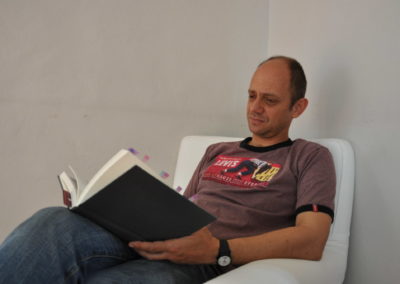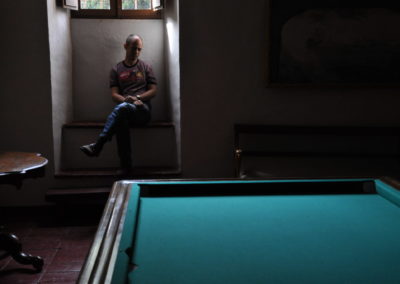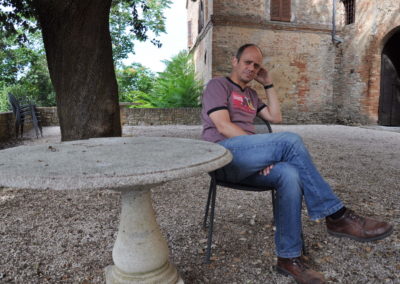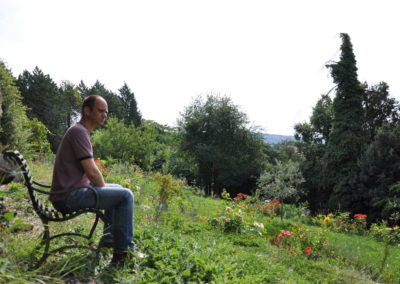Damon Galgut
From THE IMPOSTOR:
In five minutes he’s in the woods, with the sound of water nearby. The undergrowth is striped through with early light. A blue and yellow butterfly flits around him, signalling its beauty. The path is following the kloof, heading towards its narrowest point. The further he goes, the more tentative the track becomes, till the undergrowth is dragging at his feet. Trees crowd in on either side, speaking in the voices of insects and birds.
Just when he is considering turning back, the vegetation thins away and he comes out on the bank of the river, at the point where it emerges from the mountains. Dark walls rise on either side like portals; the water jets between boulders, then spreads immediately below into a wide, calm pool. In the first light the surface is almost statuesque and solid, flawlessly reflecting the far bank, the sky.
Only now does it occur to him that this must be the same river that flows through the town. It’s unlikely that there are two of them, this size, in this part of the world. The realization is startling. There is a connection, suddenly, in the form of a living blue vein, between the place where he lives and this inexplicable green paradise.
He goes over to the edge. The transparency of the water shows him a mysterious nether terrain of boulders and logs and splotches of light. He sees a fish suspended, like a hovering bird.
He looks around carefully, to make sure that he’s alone, and then sheds his clothes on the bank. He turns his chest to the sun, trying to take its heat into his paleness. Let him open up to the world! The poet in him will sing about moments like these.
He hesitates for a moment before slipping in. The coldness envelops him. He swims out into the middle of the pool, where it’s deepest. The current is barely perceptible, a faint tugging on the skin, but he imagines it washing him clean, carrying the past away. It is like baptism, but for that you need to be fully immersed: he ducks his head beneath the surface. The mirror breaks soundlessly, then composes itself around him again – sky, trees, the river-bank leaning in.
His feet find a rock and he perches there, half of his body in suspension, the other half projecting into the world. He is like the still point at the centre of everything. The first man, alone on the very first morning.
And then not.
Because somebody else is there.
First he can feel the eyes. A feeling, that’s all – an animal alarm, some vestigial instinct in his cells. He remembers the unearthly roaring in the night as he peers into the trees, making out only light and shadow and the liquid movement of birds. He turns sharply the other way. The far bank is even more inscrutable. He stares and stares – until, quite suddenly, he sees.
It’s a horrible moment. His body becomes colder than the water. Centuries of history drop away: the forest itself is staring at him – into him – with a dark face, lined and worn and old, marinated in ancient contempt. The face belongs here. Adam is the intruder, alien and unwanted; the single element in the scene that doesn’t fit. All his pagan hymns to the landscape depart, unwritten. He is about to vanish without a trace, and the shock jolts him off the rock, into deep water again.
So they look at one another, the black face in the forest and the naked white man, treading water.



